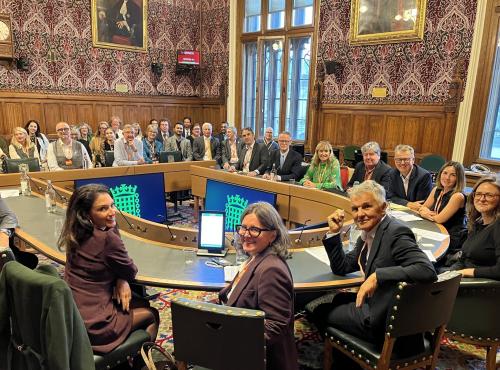First Reactions: Post-16 Education and Skills White Paper
Executive Summary
- The online call was scheduled a day after the publication of the Post-16 Education and Skills White Paper. The discussion was chaired by Lauren Edwards MP, with opening remarks from Alyson Hwang (Research and Strategy Manager, Policy Connect); David Hughes (CEO, Association of Colleges) and Robert West (Confederation of British Industry).
- Many speakers praised the Skills White Paper as ambitious, consolidating reforms to support a skilled workforce, while others raised concerns about implementation challenges, including FE capacity, funding issues, and the need for a clear skills roadmap for employers.
- Members discussed key proposed reforms include the introduction of V Levels alongside A Levels and T Levels, the establishment of Skills England for skills planning and delivery, and a renewed focus on employer partnerships, though stakeholders emphasized the need for meaningful engagement and clear pathways from Level 1 to Level 6.
- Gaps identified in the White Paper include insufficient support for adult education and lifelong learning, inadequate investment in careers guidance, and limited local/regional perspectives, with recommendations focusing on developing a clear implementation timeline, addressing the "qualifications black hole" in 2026/27, and fostering greater industry-college collaboration to meet skill demands.
Full Summary
Overview of Skills White Paper
- David Hughes (Association of Colleges) expressed optimism, calling it "the best white paper I've seen in 35 years of my career".
- Robert West (Confederation of British Industry) welcomed the publication and its ambition but noted mixed responses from employer members upon initial review.
- Alyson Hwang (Policy Connect) reflected on delivery capacity challenges, emphasis on transitions and careers, and the qualifications landscape, noting that the paper sets out promising policies, but continuity will be key.
- Positive aspects highlighted:
- Consolidation of reforms to support a skilled workforce
- Emphasis on employer partnerships
- Increased funding for colleges and recognition of their role
- Focus on collaboration and industry-college partnerships
- Concerns raised:
- White Paper feels more like a "to-do list" rather than a clear strategy
- Lack of clear skills roadmap for employers to prepare and invest effectively
- Potential for confusion with introduction of new qualifications while T Levels are still being embedded
- Financial challenges in the sector, including limited funding and increasing borrowing rates
Key Proposed Reforms
Qualifications Reform
- Introduction of V Levels alongside A Levels and T Levels
- V Levels designed to be A Level sized (360 hours) and more flexible than T Levels
- Aimed at students who may not be certain about specific occupations
- Concerns raised about V Level size limitations
- One member suggested some larger level threes could be split into V Level-sized qualifications
- A member noted the potential "qualifications black hole" in 2026/27 if applied general qualifications are defunded before V Levels are introduced.
- Members emphasized the importance of constructing clear pathways from Level 1 to Level 6 for different sectors
Skills England
- Tasked with significant responsibilities in skills planning and delivery
- A member expressed concern about Skills England being set up to fail due to extensive expectations
- Questions were raised about adequate resourcing and prioritization for Skills England
- There was emphasis on data-driven approach, but concerns about leadership and prioritization
- A member highlighted the need for sectors and regions to organize themselves to come forward with proposals; members note the additional strain this may place
Employer Engagement
- The White Paper emphasizes employer partnerships as vital to success
- Members stressed the need for meaningful partnerships giving employers a genuine voice
- Proposal for apprenticeship units and growth and skills levy, but lack of detail causing employer scepticism
- A member from industry highlighted employer interest in upskilling existing workforce and awaiting flexibilities under growth and skills levy
- Members emphasized the importance of employers as partners in the system and the need for them to invest more
Implementation Challenges
Further Education Capacity
- Many raised concerns about FE colleges' capacity to offer all demanded placements
- One member reflects on the White Paper policies by acknowledging capacity concerns but notes the significant investment in:
- Initial teacher training
- Continuous professional development
- Some funding and capital investment
- Advanced revenue funding for 16 to 19 study programs
- A speaker highlighted that many providers are already operating at the edge of viability due to:
- Staffing shortages
- Short-term funding cycles
- Fragmented accountability frameworks
- Members emphasized capital issues in Further Education and the challenge of matching course offerings with student demand and industry needs. They also stressed the importance of industry-college collaboration to increase capacity
Transitions and Pathways
- Members highlighted positive aspects in the White Paper:
- Schools given responsibility for planned positive destinations for every student at 16
- Tracking of young people at risk of becoming NEET
- Proposal for guaranteed FE college enrolment
- A member suggested need for more integration at Key Stage 3/4, including day release opportunities to colleges
- A member pointed out the issue of commercialization in education, leading to unnecessary competition between schools, FE colleges, and universities
Gaps and Areas for Development
Adult Education and Lifelong Learning
- A few members highlighted the White Paper's focus on 16-19 education, neglecting support for people already in work
- Limited options for adults over 21-22 with existing level 3 qualifications unless willing to self-fund
- A member noted the White Paper doesn't do enough to address lost adult training opportunities from previous funding cuts
- Lack of clear strategy for upskilling the existing workforce, which will form the majority of the 2035-2040 workforce
- A member highlighted significant cuts to the Adult Skills Fund over the past decade, from £3.5 billion to £1.4 billion. Further, the integration of the Adult Skills Fund with job centres can potentially impact disadvantaged groups negatively
Careers Guidance
- Members expressed concern about lack of investment in careers education and guidance
- Noted unfulfilled promise of 1,000 new careers advisor posts
- Members emphasized the importance of modern, diverse careers advice recognizing multiple career changes
- A member highlighted the need for better understanding of green careers and skills among young people
Stakeholder Perspectives
Education Providers
- A senior leader from an FE college welcomed the ambition for technical education but questioned the limitation of V Levels to A Level size
- Multiple members emphasized the need for better integration between schools and FE colleges, especially around age 14-16
Employers and Industry
- A member representing employers highlighted the need for a clear skills roadmap to allow employers to invest effectively
- Members emphasized employer need for workers with better employability skills, an area seen as lacking in the White Paper
- A representative from the FE sector stressed the importance of industry-college collaboration to increase capacity and meet skill demands
Regional/Local Authorities
- A local government representative welcomed the White Paper's ambition but called for more emphasis on local and regional perspectives, current approach is focused on national
- Suggested flipping the approach to empower residents and businesses in local places through national policy
- Members advocated for linking local growth plans and local skills improvement plans to national strategies
Recommendations and Next Steps
- Develop a clear skills roadmap with phased implementation to allow stakeholders to prepare
- Address the potential "qualifications black hole" in 2026/27 during the transition to V Levels
- Increase investment in careers education and guidance
- Consider allowing larger, more comprehensive V Level qualifications
- Develop strategies to support adult learners and upskilling of the existing workforce
- Ensure adequate resourcing and clear prioritization for Skills England
- Improve integration between schools and FE colleges, especially around age 14-16
- Address the need for better employability skills among young people entering the workforce
- Incorporate more local and regional perspectives in skills planning and delivery
- Foster greater collaboration between industry and colleges to increase capacity and meet skill demands
- Develop strategies to encourage employer investment in skills development
- Address the significant cuts to the Adult Skills Fund and develop plans to increase adult learning participation



